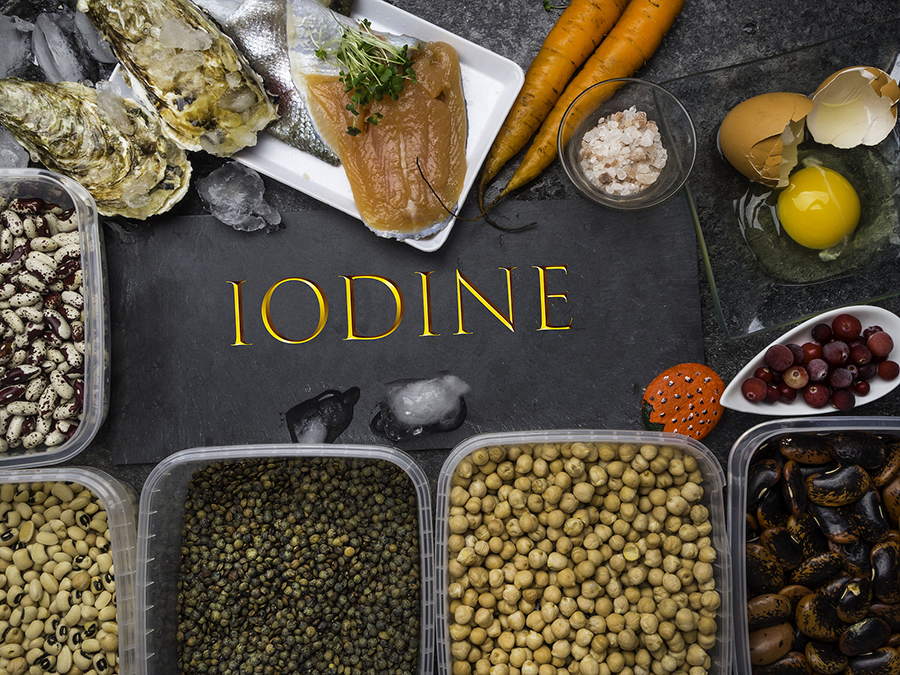 One common cause of hypothyroidism is an iodine deficiency, as iodine is essential for your body’s ability to produce the thyroid hormone.
One common cause of hypothyroidism is an iodine deficiency, as iodine is essential for your body’s ability to produce the thyroid hormone.
But because of rapid fetal development and the increased energy requirements for pregnant women, they are more vulnerable to iodine deficiency than the rest of the population.
A new study in the journal Archives of Endocrinology and Metabolism is a useful guide for pregnant women to help them through this potential problem.
Brazilian researchers conducted a literature review of previously published studies on the relationship between iodine deficiency, hypothyroidism, and the health of both the expectant mother and the fetus.
The reason why this is important is because pregnant women are vulnerable to an iodine deficiency precisely because so much of their iodine is transferred to their fetuses and because much of it is excreted in their urine.
Our bodies do not make iodine, so to avoid hypothyroidism they must consume enough iodine in their diet.
Moreover, a third of the world population is at risk of iodine deficiency because of low iodine in the soil (including most of Asia and Europe), and because of an excess of highly processed nutritionally poor foods in our diets.
Researchers have known for some time that expectant mothers with an iodine deficiency and hypothyroidism are at risk of miscarriage and that their babies have an increased likelihood of stunted growth or slow neurological development.
From the literature review, the scientists found that iodine-deficient women in their first trimester were at risk of diabetes, placental abruption (when the placenta that feeds the baby partly or completely detaches from the wall of the uterus), oxitive stress, and high blood pressure. Their children were also at risk of slow cognitive development and below average intelligence.
Women who were iodine deficient in their second and third trimesters were at higher risk of producing premature babies and babies with low birth weight. They also carry the same risks to their own health as those with an iodine deficiency in the first trimester.
The most important and promising finding was that the negative consequences of first trimester iodine deficiency can be reversed by increasing iodine intake. The consequences of second trimester iodine deficiency were partly reversible, while those of third trimester deficiency were found to be irreversible.
Luckily, it is not difficult to prevent an iodine deficiency and the consequent hypothyroidism and other health problems. All you need to do is to consume enough of this mineral in your diet.
1. Eat lots of shrimp, tuna, and cod. If you are vegan or vegetarian, seaweeds like wakame, nori, and kombu are equally good.
2. Milk, yogurt, and eggs are not only tasty, but iodine rich.
3. Stack your diet with fruits like prunes, bananas, and strawberries.
4. Iodized salt is probably the main source of iodine in most people’s diet.
Therefore, to stay healthy throughout pregnancy and produce a healthy baby, or if you are past childbearing age and you simply want to avoid hypothyroidism, you should follow these guidelines for the best results.

 Overcoming IBD
Overcoming IBD Multiple Sclerosis
Multiple Sclerosis Banishing Bronchitis
Banishing Bronchitis Gum Disease Gone
Gum Disease Gone Overcoming Onychomycosis
Overcoming Onychomycosis Neuropathy No More
Neuropathy No More The Prostate Protocol
The Prostate Protocol Brain Booster
Brain Booster
 Ironbound
Ironbound
 Solution for Shingles
Solution for Shingles
 The Bone Density Solution
The Bone Density Solution
 The Ultimate Healing Protocol
The Ultimate Healing Protocol
 The Parkinson's Protocol
The Parkinson's Protocol
 The Chronic Kidney Disease Solution
The Chronic Kidney Disease Solution
 Overthrowing Anxiety
Overthrowing Anxiety The Fatty Liver Solution
The Fatty Liver Solution The Hypothyroidism Solution
The Hypothyroidism Solution
 The End of Gout
The End of Gout The Blood Pressure Program
The Blood Pressure Program
 The Oxigized Cholesterol Strategy
The Oxigized Cholesterol Strategy
 Stop Snoring And Sleep Apnea Program
Stop Snoring And Sleep Apnea Program
 The Arthritis Strategy
The Arthritis Strategy The Vertigo & Dizziness Program
The Vertigo & Dizziness Program The 3-Step Diabetes Strategy
The 3-Step Diabetes Strategy Hemorrhoids Healing Protocol
Hemorrhoids Healing Protocol The Erectile Dysfunction Master
The Erectile Dysfunction Master Weight Loss Breeze
Weight Loss Breeze The IBS Program
The IBS Program The Insomnia Program
The Insomnia Program The Migraine and Headache Program
The Migraine and Headache Program The Neck Pain Solution
The Neck Pain Solution The Menopause Solution
The Menopause Solution The Ejaculation Master
The Ejaculation Master The TMJ Solution
The TMJ Solution The Acid Reflux Solution
The Acid Reflux Solution The Fibromyalgia Solution
The Fibromyalgia Solution The Psoriasis Strategy
The Psoriasis Strategy